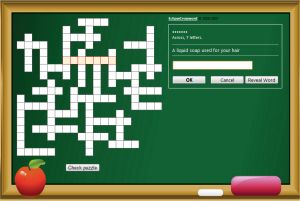Crosswords for kids help your child to learn about the meaning of words and how to use them in sentences. To solve a crossword puzzle, your child needs to search for alternative words, evaluate word choices and differentiate between homophones (words which sound the same but are spelled differently: i.e. pear and pair). These are all useful skills which help to enhance your child’s vocabulary and reinforce difficult spellings. If your child is struggling with a word, they can turn to a dictionary for help, thereby helping to develop their dictionary skills.
Here are some excellent on-line crosswords for kids created by grade level so that your child can practice spelling words appropriate for their age. I also love these homophone crosswords for kids.
There are plenty of websites which enable you to create your own crosswords for kids. I particularly like this crossword maker at The Teachers Corner.
Recently I decided to make up a crossword to help my children practice difficult spellings. Using lists of words commonly misspelled by primary children (for example, the words marked with an asterisk in this list), I chose twenty words which my children also have difficulty spelling correctly. The words I chose were:
- aunt, bear, beautiful, caught, different, enough, fourth, friend, heard, little, name, people, pretty, school, should, straight, theirs, view, wear, white.
Before attempting the crossword, however, I wanted to give my children a chance to become familiar with the spellings of these words. For this purpose, I created a word search.
Word searches for Kids
Children can solve word search puzzles without paying any particular attention to spelling by just mechanically looking for one letter after another. So if you want to use a word search puzzle as a learning mechanism, it is important to sit with your child while they are doing it and help them to take notice of the spelling patterns of the words they are looking for.
First I created this word search for kids which you can download here or click on the image below.
For this exercise, we started by looking at the word list and grouping the words according to similar attributes or spelling patterns.
First my children identified all the words with double letters (different, little, pretty, school). They started looking for these words first since the double letters made them easier to spot in the grid. Then they looked for words with common vowel letters:
- “ea”: bear, beautiful, heard, wear
- “ou”: enough, fourth, should
- “ie”: friend, view
- “au”: aunt, caught
Finally they looked for the words which didn’t fit with any pattern: name, people, straight, theirs and while.
As my children looked for each word, I made sure they sounded it out and when they found the word they said the word again while tracing the letters with their fingers.
If you want to make your own word search puzzle, you can use this word search maker.
Crosswords for Kids
Now that my children were a bit more familiar with the spelling of these tricky words, it was time for the crossword. I created this crossword for kids which you can download here or click on the image below.
I then asked my children to try to solve the crossword puzzle, reminding them that the answers were all words which they had just found in the word search puzzle. When they struggled to spell a word, I encouraged them to work it out using one of the following strategies:
- I asked them whether they remembered how we had grouped the word in the word search. For example, when struggling to spell little, it helped to remember that we had grouped it with different, pretty and school because it has a double letter.
- We used the Alphabetic Code Chart from Phonics International which lists the phonic sounds with many of their different spelling alternatives. For example, when my son was unsure how to spell the \air\ sound in wear, we looked at the chart and saw that he could choose from -air, -are, -ear or -ere. This helped him work out the correct spelling.
- If the above strategies didn’t work we used the Look-Cover-Write method for memorizing word spellings. My child looked at the word, taking care to notice difficult parts such as double letters, silent letters or unusual vowel combinations. Then we covered the word up and they wrote it on the crossword from memory.
As you can see, crosswords can be a great way to fit in lots of learning moments!



